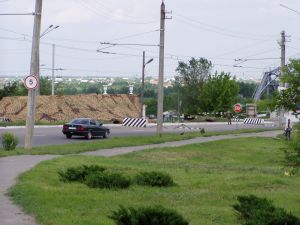History - a short overview
From a historical point of view, present-day Moldova can be divided into two regions: The first is Bessarabia, which is the region between the river Prut in the west and the Dniestr in the east; the second is Transnistria (aka Transdnjestria, Transnestria, Transdnestrien, Transdniestr etc) a small but long stretch of land between the river Nistru/Dniestr and the Ukrainian border. This piece of land is now occupied by the seceding →PMR (Pridniestran Moldovan Republic), abbr. Transnistria. For more details about that area see →History of Transnistria.
The name Bessarabia has been used for many centuries, but it doesn't seem to be clear where it's actually coming from. Until the year 1812, Bessarabia belonged to Moldavia, which is today the common name for the eastern part of Romania with →Iaşi as its former capital. The glorious Ştefan cel Mare (Stephen the Great), who ruled the mighty Moldovian empire from →Suceava between 1457 and 1504, can be seen on all Moldovan banknotes today (see picture below). In the middle of the 16th century, Moldavia incl. Bessarabia was invaded by the Ottoman empires. It remained just a small province inside the vast Ottoman empire until 1812: As a result of one of many Russian-Turkish wars, the Russian tsar gained control over Bessarabia. He soon invited German farmers to settle in the area. Hence, there are still many German place names left in Moldova, eg Marienfeld (Mary's Field) or Jacobstal (Jacob's valley) etc. In old maps, even famous names such as "Leipzig" can be found. But as already mentioned above, almost all Germans have left the country.
After more than 100 years, things got turbulent. After the October Revolution in 1918, Bessarabia declared its independence from Russia in order to unite with →Romania. In the year 1940, the Red Army occupied all of Bessarabia. This was part of the secret deal between Ribbentrop and Molotov, ie Nazi Germany and the Soviet Union.

| ||
| Russian peacekeeping forces at the Dniestr |
Only one year later, German and Romanian troops pushed back the Red Army and occupied Bessarabia. In 1944, the Red Army returned. Stalin's revenge was horrible: The country was gradually 'sovietized', the Latin script was abandoned in favour of the Cyrillic script, and countless ethnic Moldovans were killed or at least deported. Bessarabia was united with Transdniestr and so it became the Молдавская ССР (Maldavskaya SSR - Socialist Soviet Republic of Moldova), which was one of the 15 Soviet republics forming the USSR. In 1989, glasnost' arrived in Moldova. The Latin script was allowed again. In the year 1991, Moldova declared its independence, but it soon joined the CIS (Commonwealth of Independent States). Additionally, Moldova declared its full neutrality, which means that it won't be possible to join military alliances such as the NATO.
The Gagauz as well as Slavic minorities (namely Russians and Ukrainians) were afraid about a reunification with Romania and held their own presidential election in 1991. The tension between the minorities and the government in Kishinev was nothing new, but it eventually developed into a full-scale civil war between Moldova and Transdniestr in 1992 (to read more about the conflict see →History of Transnistria). Only the conflict with the Gagauz could be resolved more or less peacefully - the Gagauz were granted greater autonomy, and so →Comrat became the capital of the Gagauz Autonomous Republic.
Indeed - at the end of the 1990ies, there were many rumours about a possible unification with →Romania. But not for a long time. Today, the subject doesn't seem to be on the table any longer. Nowadays, Moldova faces a serious trade deficit and an enormous foreign debt burden. By the way, the Communist Party won 50.1% in the last election (2001), which is unique in Europe: Moldova is the one and only country with a communist president since the 1990ies. Thus, I wonder why there are so many problems with the communist →PMR.
©2024 Europe-East.com

 Albania
Albania Moldova
Moldova